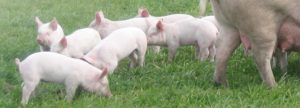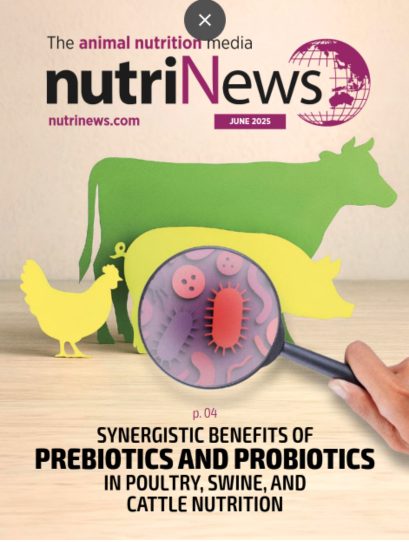With raising restrictions in the use of antimicrobials, pig production is being benefited by the the utilisaton of prebiotics, probiotics and synbiotics. This article reviews the characteristics of these additives and their benefits on health and productivity of pigs.
In intensive pig farming, animals are often subjected to stressful situations (type of management, diet changes, etc.). That stress can cause an imbalanced intestinal ecosystem, which increases the risk of suffering infections.
In swine production, most stressful situations are related to the weaning and post-weaning periods (maternal separation, end of immunity transfer through the milk, change to a solid diet, transfer to a different facility, and mixing with unfamiliar pen mates). All these factors can negatively change the balance of the intestinal microflora and the immune response of the animals, leading to an increased susceptibility to intestinal disorders, enteric infections and diarrhea (Modesto et al., 2009).
The success of the weaning and post-weaning periods inevitably depends on the addition of metaphylactic antibiotics and other compounds such as ZnO to the diet. However, governments and stakeholders from around the world are indreasingy concerned about the excessive use of this type of medication. As a result, they have generated several strategies to cope with a drastic reduction in the inclusion of medicated premix in animal diets. Some of them include the utilisation of prebiotics, probiotics and synbiotics in pig diets.
Stressful situations negatively affect the balance of the intestinal microflora and the immune response of the animals.
Probiotics
Some of strategies amntioned above include the use of probiotics. Such products are becoming a subject of research looking at reducing pathogen load in pig production. Although the ultimate aim is to control the occurrence of gastrointestinal conditions during the first stages of life, there are also projects researching probiotics in fattening pigs and breeding sows.
Probiotics are used in all the swine production phases.
Bacillus

B. licheniformis and B. subtilis have some immunomodulatory effect, which in part explain the improvements in diarrhea episodes during the post-weaning period.
A group of researchers from the University of Copenhagen (Larsen et al., 2014) identified several bacterial strains belonging to the genus Bacillus, isolated from soil, feces and fermented foods. The results indicate that these strains are ideal to use as probiotics in animal nutrition.
In fact, some of these Bacillus species were the first ones to be used in swine nutrition, and their efficacy have been proved through studies conducted for many years.
Particularly relevant are the extensive studies conducted by Alexopoulos et al. (2004), which showed that the administration of B. licheniformis and B. subtilis spores reduces morbidity and mortality in newly weaned piglets, and increased production performance.
Also, in a trial conducted by Wang et al. (2009), fattening pigs were fed diets supplemented with B. licheniformis and B. subtilis. The results showed a significant reduction in ammonia emission and a decrease of slurry pH.
Aperce et al. (2010) observed that B. licheniformis and B. subtilis have some immunomodulatory effect in the intestinal epithelium, which could in part explain the post-weaning improvements in diarrhea episodes when both Bacillus species were added to piglet diets.
In short, from the studies on the use of B. licheniformis and B. subtilis in pig diets , it is clear that the addition of both Bacillus species positively affects the intestinal ecosystem. On the other hand, it has been demonstrated that the addition of a B. subtilis strain to diets fed to weaned piglets led to a reduction of E. coli K88 counts in feces, within 24 hours after the exposure to the pathogen (Bhandari et al., 2008).
Enterococcus
Some species of the genus Enterococcus have also been subject of numerous studies over the past years. The oral supplementation of piglets with E. faecium, from birth to weaning, reduced the number of cases of diarrhea and improved performance, the latter observed as a higher average daily gain (Zeyner and Boldt, 2006). Also, Vahjen et al. (2007) observed that the use of E. faecium as a probiotic in weaned piglets reduced colon E. faecalis population, which is responsible for the onset of diarrhea in the post-weaning period. Several studies have found that E. faecium has a beneficial effect when used as a probiotic in diets fed to piglets and sows ( Scharek et al., 2005; Lodemann et al., 2006; Taras et al., 2006; Szabó et al., 2009).
Lactobacillus

Thre presence of lactobacilli in the indigenous flora of animals is well known
Several studies have been carried out to evaluate Lactobacillus strains, since its presence in the indigenous microbiota of pigs is well known .
Qiau et al. (2015) examined the effects of adding L. acidophilus to diets fed to weaned piglets, challenged with an intraperitoneal injection of lipopolysaccharide (LPS). The piglets fed diets containing lactobacilli showed a higher average daily gain, compared with the control group. Also, lactobacilli count in rectal samples was significantly higher in the animals supplemented with probiotics, compared with the control group. It was also shown that the addition of L. acidophilus to piglet diets resulted in a significant reduction of E. coli count in the rectum. Of special interest in this study by Qiau et al. (2015) is the lower LPS-in duced inflammatory reaction in piglets fed diets containing probiotics, compared with the control animals.
Other studies had previously demonstrated the positive effects of lactobacilli species used as probiotics (Takahashi et al., 2007; Nemcova et al., 2007; Collado et al., 2007; Konstantinov et al., 2008; Zhang et al., 2010).
Yeasts
Yeast-based probiotics, such as Saccharomyces spp., have also showed positive effects on the productive performance, health status and immune response, particularly in breeding sows and piglets (Shen et al. 2011; Kiarie et al., 2012; Zanello et al., 2013; Trckova et al., 2014; Wang et al., 2015).
Yeast-based probiotics have also showed positive effects on the productive performance of the animals.
Prebiotics
For many years, the use of different types of prebiotics in pig diets has shown a beneficial effect of these compounds on the productive performance of the animals (Hidaka et al., 1985; Katta et al., 1993; Bouldan et al., 1993). After the first investigations, the studies on the use of prebiotics in pig nutrition have focused on the evaluation of their influence in the intestinal microflora or in the improvement of health status.
Non-digestible oligosaccharides: TOS, GOS
Smiricky-Tjardes et al. (2003) added TOS (transgalactoligosaccharides) to a diet fed to growing pigs at a level of 35 g/kg. The results showed a significant increase in the fecal populations of bifidobacteria and lactobacilli.
Similarly, a combination of galactoligosaccharides (GOS) was fed to the animals at 40g/kg of feed. This resulted in a significantly higher density of bifidobacteria and a reduced intestinal pH , compared with pigs fed a control diet supplemented with inulin (Tzortzis et al., 2005).
Also, the same combination of oligosaccharides strongly inhibited the binding of E. coli and Salmonella enterica serotype Typhimurium to HT29 cells in an in vitro assay conducted by the same research group.

The role of prebiotics in pig diets appears to be quite variable and, due to this, further investigation is needed to clarify this role and also their effects on the productive performance and health status of the animals.
Sinbyotics
Guerra-Ordaz et al. (2014) investigated the potential use of lactulose, of a prebiotic strain of Lactobacillus plantarum, and of the synbiotic combination of both, to control post-weaning colibacillosis in piglets. The animals were orally challenged with enterotoxigenic E. coli K88, after receiving one of the products for 7 days.
The researchers observed that the inclusion of prebiotic (lactulose):
- improved the average daily gain
- increased the colonic lactobacilli populations
- increased the butyric acid concentrations in the colon
- improved ileal villus height,
- reduced serum concentration of Pig-MAP (major acute phase protein)
Meanwhile, the addition of probiotics to the diet resulted in:
- higher L. plantarum count in the ileum and colon
- increase in colonic lactobacilli population
- reduction in colonic and ileal ammonia concentrations
- a tendency to reduce the occurrence of diarrhea
- increase in ileal villus height and number of goblet cells.
- reduction of tumor necrosis factor-alpha.
The positive effects of both additives were combined when they were given together to the animals. They constituted a complementary synbiotic with certain potential to control post-weaning colibacillosis.

In the face of the challenges posed by regulations regarding the use of medications in animal production, probiotics, prebiotics and synbiotics certainly play an increasingly important role in pig nutrition and health.
This article was originally puflished in nutriNeus Spain, with the title “Aplicación de probióticos, prebióticos y simbióticos en porcino”












